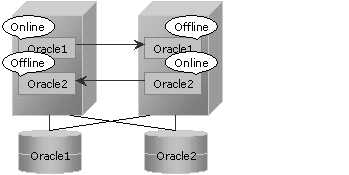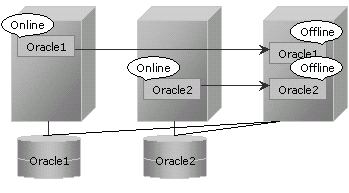

| PRIMECLUSTER Wizard for Oracle Configuration and Administration Guide 4.2 - Linux for Itanium - |
Contents
 
|
| Chapter 2 Environment Setup | > 2.2 Standby Operation |
Create a database on the shared disk. The shared disk must be activated.
The files are allocated as follows:
|
Files |
Locations |
Note |
|
|
Init.ora file |
Arbitrary |
Choose either |
|
|
Server parameter file |
Share |
Refer to the following item "Parameter file" |
|
|
Password file |
Share |
- |
|
|
Control files |
Share |
- |
|
|
Data files |
Share |
- |
|
|
Redo log files |
Share |
- |
|
|
Archive log files |
Arbitrary |
Recommend to be multiplexed, allocating on a shared disk and a local disk. |
|
|
Flash Recovery Area |
Share |
- |
|
|
log files |
audit_file_dest |
Local |
To be gathered surely for trouble investigation, allocate them on a local disk of each node. |
|
background_dump_dest |
Local |
||
|
core_dump_dest |
Local |
||
|
user_dump_dest |
Local |
||

Create a database on the operating node. The database must be accessible from the standby nodes.

Refer to the Oracle manual.
Set up the standby nodes in the same configuration (directory creation, file copy, and links) as the operating node.
Under <$ORACLE_HOME>/dbs
Under <$ORACLE_BASE>/admin/<$ORACLE_SID>
Under <$ORACLE_HOME>/network/admin
The access privilege to the directories and files must be also the same as that on the operating node.
If you set where archive log is output on the operating node, it is necessary to set the same on the standby nodes.

The required files on the operating node can be backed up in the tar format with the "cloracpy" command. Refer to "4.4 cloracpy - Create Backup File for Oracle Database Setup".
Create a database on an operating node.
The database on the shared disk created on the operating node must be accessible from the standby nodes. This is the same as the other operation modes.

Mutual standby


2:1 Standby

The initial parameter setting of LOCAL_LISTENER must be compatible with that of listener.ora and tnsnames.ora. You should also pay close attention to set up Oracle network. If you use the init.ora file, allocate it on either a local disk or a shared disk.
If you use server parameter file, allocate it on a shared disk. If it is not allocated on the shared disk, the settings will be inconsistent between operating and standby nodes.
After you allocate server parameter file on a shared disk, make a symbolic link file to refer to the file on a shared disk in operation and standby both nodes. Set it by either following methods:
-Method of making a symbolic link file to server parameter file on a shared disk.
-Method to write the path of the server parameter file in an init.ora file.

-Method of making a symbolic link file to server parameter file on a shared disk.
|
$ ln -s <the mount point of a shared disk>/spfile<$ORACLE_SID>.ora <$ORACLE_HOME>/dbs/spfile<$ORACLE_SID>.ora |
-Method to write the path of the server parameter file in an init.ora file.
|
spfile = <the mount point of a shared disk>/spfile<$ORACLE_SID>.ora |

If you create a database using DBCA (Database Configuration Assistant) in the Oracle 10g environment, you might not be able to specify where the server parameter file is stored. If this occurs, move the server parameter file to the shared disk after creating the database as follows:
|
#mv <$ORACLE_HOME>/dbs/spfile<$ORACLE_SID>.ora <shared disk>/spfile<$ORACLE_SID>.ora |
Execute step 3 on the operation and the standby both nodes.
You can also use the cloracpy command to execute it on the standby nodes after the operating node.
The files are allocated as follows:
|
Files |
Locations |
Note |
|
listener.ora |
Arbitrary |
For placement of the file, refer to the below "information". |
|
tnsnames.ora |
Arbitrary |
Same as above |
|
<LISTENER>.log |
Local |

Allocate listener.ora file and tnsnames.ora file on either a local disk or a shared disk. To which allocate them, refer to the following.
- Local disk
When allocate those files on a local disk, it is necessary to edit them of each node. Therefore, the maintenance efficiency decreases compared with the case allocated on a shared disk. In one side, it is possible to gather the files surely when the trouble is investigated because the influence of the state of the mount of a shared disk is not received.
- Shared disk
When allocate those files on a shared disk, it only has to edit them on a shared disk. Therefore, the maintenance efficiency improves compared with the case allocated on a local disk. In one side, when the mount is not done, a shared disk might not be able to gather the necessary files for the trouble is investigated.
When allocate those files on a shared disk, make a symbolic link file under the "$ORACLE_HOME/network/admin/" of each node.
|
- In the case of listener.ora $ ln -s <the mount point of a shared disk>/listener.ora <$ORACLE_HOME>/network/admin/listener.ora - In the case of tnsnames.ora $ ln -s <the mount point of a shared disk>/tnsnames.ora <$ORACLE_HOME>/network/admin/tnsnames.ora |
"\" mark shows that the command line continues to the next line.
If you use Oracle listener switching operation using a logical IP address for standby operation, specify the logical IP address for the IP address of the Oracle listener.

|
LISTENER = |

In Oracle 10g or later environment, operating system authentication of Listener must be enabled. There are two methods to enable it:
|
LOCAL_OS_AUTHENTICATION_<LISTENER_NAME> = ON |
If the Oracle listener is monitored through tnsping, set up the "tnsnames.ora" file. Then, specify the network service name set for tnsnames.ora in the environment setting of the Oracle listener of PRIMECLUSTER Wizard for Oracle. In that case, ORACLE_SID, host (logical IP address), and port number must be the same as those of the Oracle listener.

|
Network service name = |
PRIMECLUSTER Wizard for Oracle accesses and monitors Oracle as the Oracle system user. Therefore, the system user's password must be registered in PRIMECLUSTER Wizard for Oracle. Refer to "4.3 clorapass - Register Password for Monitoring" to register the password.
Check if Oracle is properly running by starting and stopping the Oracle instance and Oracle listener manually.

Contents
 
|